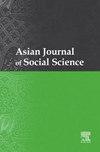Media-crafted social inequality: Analyzing the disconnect between Gap Society discourse and social inequality in post-bubble Japan
IF 1.2
4区 社会学
Q2 AREA STUDIES
引用次数: 0
Abstract
This paper explores the evolution of Gap Society discourse in Japan from 1988 to 2023, analyzing the disconnect between media portrayals and actual social conditions. Through a combination of critical discourse analysis (CDA) and text mining, the study identifies key discourse types—political, economic, academic, educational, social, and literary—across four periods of growth and decline. It finds that political discourse predominated during periods of growth, while literary discourse gained importance during declines. The study highlights the role of media in constructing symbolic realities, revealing how different newspapers employ similar frameworks to report on the Gap Society, thereby shaping a collective narrative that diverges from objective social conditions. Additionally, this paper also shows how shifting power dynamics among scholars, newspaper editors, writers, and the general public have influenced the evolution of the discourse. This mechanism, rooted in state-led modernization, may be a unique phenomenon in East Asia.
媒体制造的社会不平等:分析后泡沫时代日本差距社会话语与社会不平等之间的脱节
本文探讨了1988年至2023年日本差距社会话语的演变,分析了媒体描述与实际社会状况之间的脱节。通过批判性话语分析(CDA)和文本挖掘的结合,该研究确定了四个时期的关键话语类型——政治、经济、学术、教育、社会和文学。研究发现,政治话语在增长时期占主导地位,而文学话语在衰退时期变得重要起来。该研究强调了媒体在构建象征性现实中的作用,揭示了不同的报纸如何采用相似的框架来报道差距社会,从而形成了与客观社会条件不同的集体叙事。此外,本文还展示了学者、报纸编辑、作家和公众之间的权力动态变化如何影响了话语的演变。这种植根于国家主导的现代化进程的机制,可能是东亚的一种独特现象。
本文章由计算机程序翻译,如有差异,请以英文原文为准。
求助全文
约1分钟内获得全文
求助全文
来源期刊

Asian Journal of Social Science
Multiple-
CiteScore
1.20
自引率
0.00%
发文量
53
期刊介绍:
The Asian Journal of Social Science is a principal outlet for scholarly articles on Asian societies published by the Department of Sociology, National University of Singapore. AJSS provides a unique forum for theoretical debates and empirical analyses that move away from narrow disciplinary focus. It is committed to comparative research and articles that speak to cases beyond the traditional concerns of area and single-country studies. AJSS strongly encourages transdisciplinary analysis of contemporary and historical social change in Asia by offering a meeting space for international scholars across the social sciences, including anthropology, cultural studies, economics, geography, history, political science, psychology, and sociology. AJSS also welcomes humanities-oriented articles that speak to pertinent social issues. AJSS publishes internationally peer-reviewed research articles, special thematic issues and shorter symposiums. AJSS also publishes book reviews and review essays, research notes on Asian societies, and short essays of special interest to students of the region.
 求助内容:
求助内容: 应助结果提醒方式:
应助结果提醒方式:


